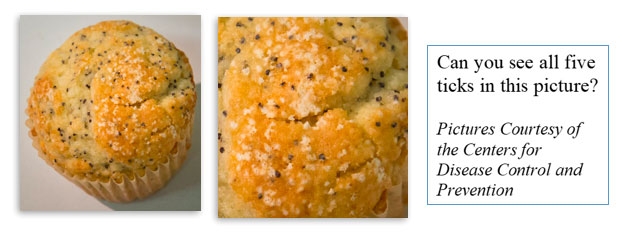Tick Season Advice: Avoid Walking Poppy Seeds

By Jan Lyon | TNT-Tick Natural Terminator | www.Tntticks.com
Transmitted through the blacklegged tick (deer tick), Lyme disease is the most studied and notable of the tickborne diseases. However, there are many other co- infections spread by these 8-legged creatures that are close behind in numbers of reported illness. These diseases pose huge threats to people and animals alike.
Currently on the radar among vector-borne illness researchers is the lone star tick. Previously this tick was only established in the southeastern Unites States, but colonies are now established in the upper Midwest and Northeast. Each female lone star tick will lay thousands of eggs, and as they grow to larva, nymph and adult, they will feed on animals at all stages of life, putting you, your horses, and domestic pets at risk for the diseases they may be harboring. The two smaller life stages also feed on birds. Because of this, they have the ability to travel farther than if they were on mammals. In recent decades, there have been proven breeding populations of these ticks in New Jersey, New York, Rhode Island, Connecticut, Massachusetts and Maine. The New York populations were reported as early as 1971 and the Massachusetts populations were confirmed in 2019, indicating a northern movement of the tick species.
Genetic research has shown that the lone star ticks in New York are different than the lone star sticks in New Jersey and the southeast United States. This indicates evolution of the species and suggests they are adapting to colder climates.
It is imperative that all who spend time outside and with our animals remain on the lookout for both black legged ticks and lone star ticks during routine tick checks. It would be wise to capture them, have them identified, and sent to a lab such as the Thangamani Lab at Upstate Medical University in Syracuse, NY for disease testing. The nymph stage of the blacklegged tick is the most likely to transmit Lyme disease because they often go undetected and are not removed from the host.
Because ticks are so small and difficult to spot, especially nymphal stage ticks, TNT is a great product to use. Nymphal ticks are only the size of a poppy seed. If they are infected with the bacteria that causes Lyme, they can give you and your pets the disease just as easily as the larger larval or adult stage ticks.
My friend, Kathy, and I have been trail ride buddies for decades. Many repellents we used were either ineffective or did not last long enough. Plus, we did not like overusing them because of the nerve agent chemicals they contained. Through years of research and many years of trials with ourselves and our families and friends, we developed a product that gave us peace of mind while we rode on tick infested trails. The evolution of this product resulted in an even longer lasting, more effective design that we call TNT-Tick Natural Terminator. We have used this product for over 20 years without seeing an embedded tick on our animals, and now will not ride without it. Because it has been so effective, we decided to get TNT-Tick Natural Terminator out to fellow trail riders, hikers, or people who just want to keep their animals and themselves tick free. Our patent pending formulation is what makes this product effective. All the ingredients we use are FDA approved. It is safe to use with other pest control products, like mosquito sprays, because there is no chemical interaction. Our happy customers are also reporting TNT works great for the spring gnats as well!
There is a lot more information about our product on our website: tntticks.com. TNT-Tick Natural Terminator is also available on Amazon and through Wal-Mart online. We recommend application with a stiff body brush or by using a Scratch Me Silly for places that are hard to reach. (see Scratchnall.com)
Kathy and I wish you happy and tick free horsing around!
